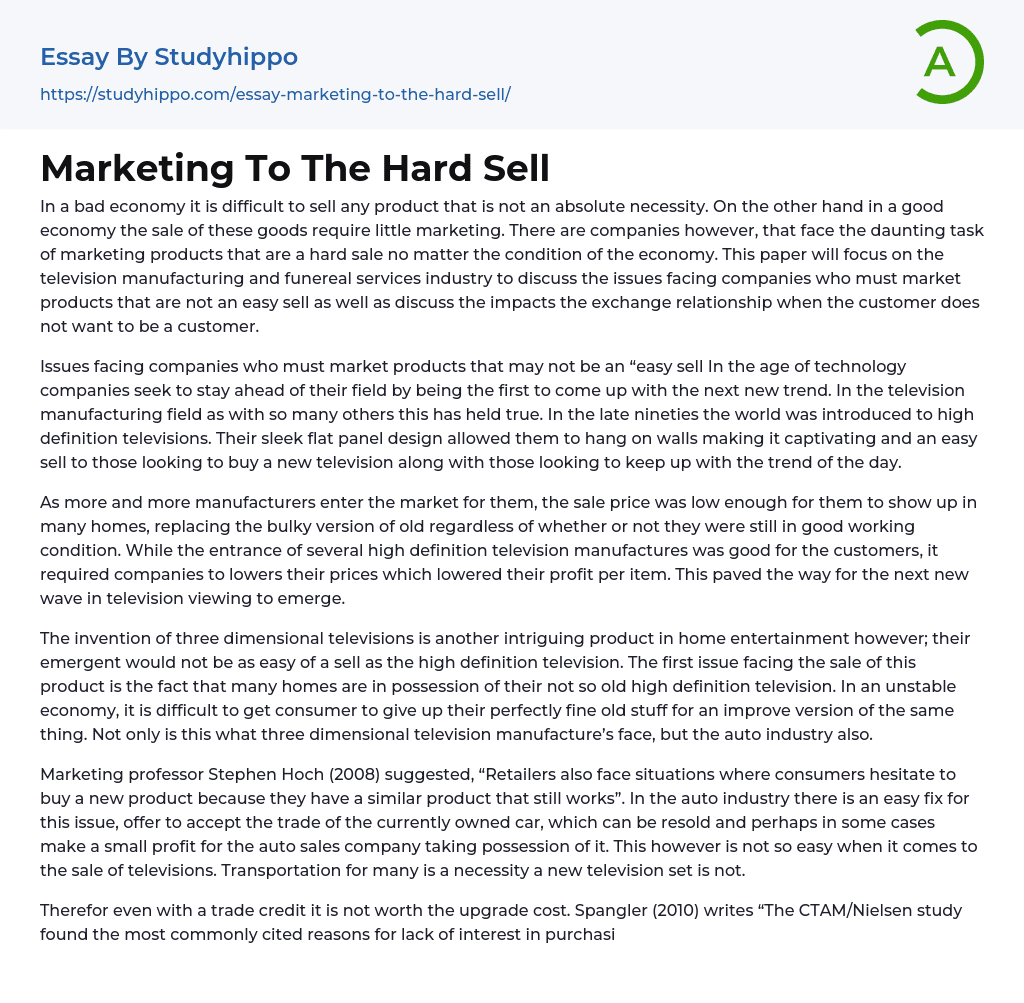In both tough economic times and prosperous ones, it can be difficult to sell non-essential products. Certain companies, like those in the television manufacturing and funeral services industry, face the challenge of promoting goods that are hard to sell regardless of economic conditions. This article will discuss the challenges these companies encounter when marketing low marketability products and how this impacts the exchange relationship with hesitant customers.
Companies face challenges when promoting products that may not be easily marketable. To stay ahead of the competition, companies strive to be innovators in their industry by introducing new trends. This has been particularly evident in the television manufacturing sector and other industries. In the late 1990s, high definition televisions were launched worldwide. Their sleek flat panel design made them visually stunning and an attracti
...ve choice for consumers looking to purchase a new TV or keep up with the latest trend.
With the increase in manufacturers, high definition televisions have become more affordable for households. As a result, these televisions are now widely used and often replace older models, even if they are still functional. Although this benefits customers, it has led companies to reduce prices and decrease profits. Nevertheless, this advancement has opened doors for the introduction of the next generation of television viewing.
The introduction of 3D televisions has created an engaging product for home entertainment, but implementing it may not be as easy as high definition televisions. The challenge lies in convincing consumers to replace their fully functional high definition TVs with an upgraded version in uncertain economic times. This obstacle is not exclusive to 3D television manufacturers, but als
affects the automotive industry.
According to marketing professor Stephen Hoch (2008), retailers face challenges when consumers hesitate to buy a new product if they already own a similar functioning one. The automobile industry can tackle this issue by offering to trade in the customer's existing car, which can be resold and potentially yield some profit for the auto sales company. However, selling televisions is not as straightforward. Unlike transportation, a new television is not essential for the majority of individuals.
Despite having a trade credit, the cost of upgrading makes it not worth it. According to Spangler (2010), the most commonly mentioned reasons for lack of interest in purchasing a 3D TV include its high cost (68%), the need to wear 3D glasses (57%), and inadequate 3D programming (44%). The exchange relationship regarding 3D Television is not about consumers' desire to buy or choosing a more suitable target market; rather, it is solely due to the fact that the cost outweighs consumers' preferences.
The exchange relationship is influenced differently when it comes to funeral products and services. The consumer, in this case, does not see themselves as a consumer but as someone in need due to the distressing circumstances. Consequently, emotion has the greatest impact on this exchange relationship. Companies operating in this industry should handle this relationship with caution. The employees who directly interact with consumers play a vital role in the company's marketing strategy.
The text highlights the vulnerability of consumers caused by their limited knowledge and emotional reactions to products and services, which can be exploited. Nonetheless, it is essential for companies to handle such situations with
caution, care, and concern. According to Mullins (2010), exchanges are vital for both individuals and organizations to benefit from economic growth by enhancing specialization and productivity. However, these exchanges do not occur automatically and not all of them result in a mutually satisfying long-term relationship.
Even though there is a reluctance to engage in consumer buying funeral services, these services are still necessary. Due to the lack of marketing efforts in this industry, sales representatives play a crucial role in creating a positive experience for customers. This act can be considered a form of marketing and helps foster a mutually satisfying and potentially enduring relationship. Furthermore, word of mouth advertising holds great importance for companies serving hesitant customers.
In a weak economy, it can be challenging to market a product to the right consumer, especially if they have no interest in the product. Both parties involved in the exchange relationship consider cost crucial, and meeting customer needs is essential. Companies encounter various obstacles when attempting to identify and anticipate consumer needs, desires, and willingness to pay for difficult-to-sell products.
- Chief Executive Officer essays
- Convenience Store essays
- Firm essays
- Training And Development essays
- Unilever essays
- Variable Cost essays
- Virgin Group essays
- Bargaining essays
- Entity essays
- Pest analysis essays
- Advertising essays
- Audience Theory essays
- Competitor Analysis essays
- Consumer essays
- Marketing Management essays
- Marketing Mix essays
- Marketing Plan essays
- Marketing Research essays
- Marketing Strategy essays
- Point Of Sale essays
- Price essays
- Procurement essays
- Product essays
- Product Differentiation essays
- Promotion essays
- Promotion And Marketing Communications essays
- Retailing essays
- Trademark essays
- Anheuser-busch essays
- Brands essays
- Detergent essays
- Product Placement essays
- Research Design essays
- New Product Development essays
- Advertisement essays
- Brand essays
- Sales Promotion essays
- Advertising campaign essays
- Consumer behaviour essays
- Offer And Acceptance essays
- Wal-Mart essays
- Discover essays
- John Locke essays
- 9/11 essays
- A Good Teacher essays
- A Healthy Diet essays
- A Modest Proposal essays
- A&P essays
- Academic Achievement essays
- Achievement essays




